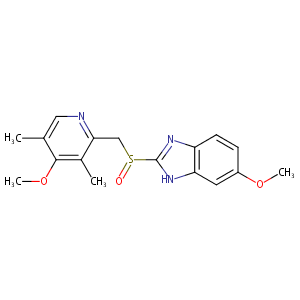| 1 |
ClinicalTrials.gov (NCT01287598) BAY73-4506 Probe Substrate Study
|
| 2 |
Omeprazole FDA Label
|
| 3 |
URL: http://www.guidetopharmacology.org Nucleic Acids Res. 2015 Oct 12. pii: gkv1037. The IUPHAR/BPS Guide to PHARMACOLOGY in 2016: towards curated quantitative interactions between 1300 protein targets and 6000 ligands. (Ligand id: 4279).
|
| 4 |
Regorafenib FDA Label
|
| 5 |
URL: http://www.guidetopharmacology.org Nucleic Acids Res. 2015 Oct 12. pii: gkv1037. The IUPHAR/BPS Guide to PHARMACOLOGY in 2016: towards curated quantitative interactions between 1300 protein targets and 6000 ligands. (Ligand id: 5891).
|
| 6 |
Use of mRNA expression to detect the induction of drug metabolising enzymes in rat and human hepatocytes. Toxicol Appl Pharmacol. 2009 Feb 15;235(1):86-96.
|
| 7 |
Drugs@FDA. U.S. Food and Drug Administration. U.S. Department of Health & Human Services.
|
| 8 |
A novel screening strategy to identify ABCB1 substrates and inhibitors. Naunyn Schmiedebergs Arch Pharmacol. 2009 Jan;379(1):11-26.
|
| 9 |
Substrates, inducers, inhibitors and structure-activity relationships of human Cytochrome P450 2C9 and implications in drug development. Curr Med Chem. 2009;16(27):3480-675.
|
| 10 |
Impact of intestinal CYP2C19 genotypes on the interaction between tacrolimus and omeprazole, but not lansoprazole, in adult living-donor liver transplant patients. Drug Metab Dispos. 2009 Apr;37(4):821-6.
|
| 11 |
Human CYP2C19 is a major omeprazole 5-hydroxylase, as demonstrated with recombinant cytochrome P450 enzymes. Drug Metab Dispos. 1996 Oct;24(10):1081-7.
|
| 12 |
Comparison of inhibitory effects of the proton pump-inhibiting drugs omeprazole, esomeprazole, lansoprazole, pantoprazole, and rabeprazole on human cytochrome P450 activities. Drug Metab Dispos. 2004 Aug;32(8):821-7.
|
| 13 |
A cell-based reporter gene assay for determining induction of CYP3A4 in a high-volume system. J Pharmacol Exp Ther. 2002 Oct;303(1):412-23.
|
| 14 |
Measurement of cytochrome P450 gene induction in human hepatocytes using quantitative real-time reverse transcriptase-polymerase chain reaction. Drug Metab Dispos. 2000 Jul;28(7):781-8.
|
| 15 |
Evaluation of gene induction of drug-metabolizing enzymes and transporters in primary culture of human hepatocytes using high-sensitivity real-time reverse transcription PCR. Yakugaku Zasshi. 2002 May;122(5):339-61.
|
| 16 |
HepaRG cells as an in vitro model for evaluation of cytochrome P450 induction in humans. Drug Metab Dispos. 2008 Jan;36(1):137-45.
|
| 17 |
A novel xenobiotic responsive element regulated by aryl hydrocarbon receptor is involved in the induction of BCRP/ABCG2 in LS174T cells. Biochem Pharmacol. 2010 Dec 1;80(11):1754-61.
|
| 18 |
Interference with bile salt export pump function is a susceptibility factor for human liver injury in drug development. Toxicol Sci. 2010 Dec; 118(2):485-500.
|
| 19 |
Omeprazole inhibits pancreatic cancer cell invasion through a nongenomic aryl hydrocarbon receptor pathway. Chem Res Toxicol. 2015 May 18;28(5):907-18.
|
| 20 |
Effect of common medications on the expression of SARS-CoV-2 entry receptors in liver tissue. Arch Toxicol. 2020 Dec;94(12):4037-4041. doi: 10.1007/s00204-020-02869-1. Epub 2020 Aug 17.
|
| 21 |
Environmental contaminants activate human and polar bear (Ursus maritimus) pregnane X receptors (PXR, NR1I2) differently. Toxicol Appl Pharmacol. 2015 Apr 1;284(1):54-64. doi: 10.1016/j.taap.2015.02.001. Epub 2015 Feb 10.
|
| 22 |
Proton pump inhibitor lansoprazole is a nuclear liver X receptor agonist. Biochem Pharmacol. 2010 May 1;79(9):1310-6. doi: 10.1016/j.bcp.2009.12.018. Epub 2010 Jan 8.
|
| 23 |
Hyperprolactinaemia induced by proton pump inhibitor. J Pak Med Assoc. 2010 Aug;60(8):689-90.
|
| 24 |
Systems pharmacological analysis of drugs inducing stevens-johnson syndrome and toxic epidermal necrolysis. Chem Res Toxicol. 2015 May 18;28(5):927-34. doi: 10.1021/tx5005248. Epub 2015 Apr 3.
|
| 25 |
Proton pump inhibitors interfere with the anti-tumor potency of RC48ADC. Toxicol In Vitro. 2022 Mar;79:105292. doi: 10.1016/j.tiv.2021.105292. Epub 2021 Dec 3.
|
| 26 |
Beyond gastric acid reduction: proton pump inhibitors induce heme oxygenase-1 in gastric and endothelial cells. Biochem Biophys Res Commun. 2006 Jul 7;345(3):1014-21. doi: 10.1016/j.bbrc.2006.04.170. Epub 2006 May 6.
|
| 27 |
Omeprazole induces apoptosis in jurkat cells. Int J Immunopathol Pharmacol. 2004 Sep-Dec;17(3):331-42. doi: 10.1177/039463200401700313.
|
| 28 |
High-content imaging-based BAC-GFP toxicity pathway reporters to assess chemical adversity liabilities. Arch Toxicol. 2017 Mar;91(3):1367-1383. doi: 10.1007/s00204-016-1781-0. Epub 2016 Jun 29.
|
| 29 |
Omeprazole induces apoptosis in normal human polymorphonuclear leucocytes. Int J Immunopathol Pharmacol. 2008 Jan-Mar;21(1):73-85. doi: 10.1177/039463200802100109.
|
| 30 |
TCDD and omeprazole prime platelets through the aryl hydrocarbon receptor (AhR) non-genomic pathway. Toxicol Lett. 2015 May 19;235(1):28-36. doi: 10.1016/j.toxlet.2015.03.005. Epub 2015 Mar 19.
|
| 31 |
Proton pump inhibitors block iron absorption through direct regulation of hepcidin via the aryl hydrocarbon receptor-mediated pathway. Toxicol Lett. 2020 Jan;318:86-91. doi: 10.1016/j.toxlet.2019.10.016. Epub 2019 Oct 24.
|
| 32 |
ADReCS-Target: target profiles for aiding drug safety research and application. Nucleic Acids Res. 2018 Jan 4;46(D1):D911-D917. doi: 10.1093/nar/gkx899.
|
| 33 |
Regorefenib induces extrinsic/intrinsic apoptosis and inhibits MAPK/NF-B-modulated tumor progression in bladder cancer in vitro and in vivo. Environ Toxicol. 2019 Jun;34(6):679-688. doi: 10.1002/tox.22734. Epub 2019 Feb 25.
|
| 34 |
Drugs@FDA. U.S. Food and Drug Administration. U.S. Department of Health & Human Services. 2015
|
| 35 |
Regorafenib is transported by the organic anion transporter 1B1 and the multidrug resistance protein 2. Biol Pharm Bull. 2015;38(4):582-6.
|
| 36 |
Brain and Testis Accumulation of Regorafenib is Restricted by Breast Cancer Resistance Protein (BCRP/ABCG2) and P-glycoprotein (P-GP/ABCB1). Pharm Res. 2015 Jul;32(7):2205-16.
|
| 37 |
KEGG: new perspectives on genomes, pathways, diseases and drugs. Nucleic Acids Res. 2017 Jan 4;45(D1):D353-D361. (dg:DG01913)
|
| 38 |
FDA Label of Regorafenib. The 2020 official website of the U.S. Food and Drug Administration.
|
| 39 |
Cytotoxicity of 34 FDA approved small-molecule kinase inhibitors in primary rat and human hepatocytes. Toxicol Lett. 2018 Jul;291:138-148. doi: 10.1016/j.toxlet.2018.04.010. Epub 2018 Apr 12.
|
|
|
|
|
|
|


